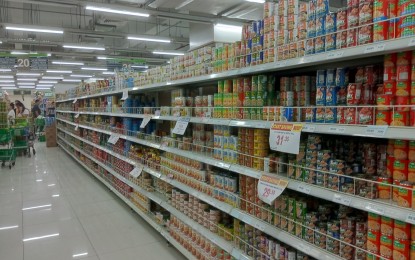
FOOD STOCKS. Popular canned goods displayed in a supermarket in Bacolod City in this undated photo. Inflation rates in Bacolod City and Negros Occidental slowed further in September, according to a report from the Philippine Statistics Authority on Monday (Oct. 7, 2024). (PNA Bacolod file photo)
BACOLOD CITY – Inflation rates for all income households in this highly-urbanized city and the province of Negros Occidental eased further in September due to lower prices of various commodities, including food and non-alcoholic beverages.
A summary report of the Philippine Statistics Authority (PSA) here on Monday showed last month’s inflation in Bacolod City was pegged at 3.9 percent from 5.7 percent in August, while in Negros Occidental, 3.2 percent in September, from 4.6 percent in the previous month.
This is the second consecutive month inflation rates decelerated in both the city and province this year after a series of spikes since January.
In August, inflation slowed to 5.6 percent from 6.2 percent in July in Bacolod City and also eased to 4.5 percent from the previous 4.8 percent in Negros Occidental.
According to the PSA inflation report and consumer price index (CPI), the decline in the inflation rate in Bacolod City can be “attributed to a slight decrease in the indices of some commodities.”
These include food and non-alcoholic beverages, alcoholic beverages and tobacco, housing/water/electricity/gas and other fuels, and furnishings/household equipment and routine household maintenance. Others are health, transport, education services, and personal care and miscellaneous goods and services.
In Negros Occidental, “almost all of the commodities were noted to have a negative annual growth rate.”
Included are food and non-alcoholic beverages; alcoholic beverages and tobacco; housing/water/electricity/gas and other fuels; furnishing/household equipment and routine maintenance; and transport.
Also listed are recreation/sports and culture, education services, restaurants and accommodation services, and personal care and miscellaneous goods and services.
The CPI provides a general measure of the changes in average retail prices of commodities bought by a specific group of consumers in a given area and period.
Inflation is the annual rate of change or the year-on-year change of the CPI expressed in percent and interpreted in terms of the declining purchasing power of money. (PNA)
